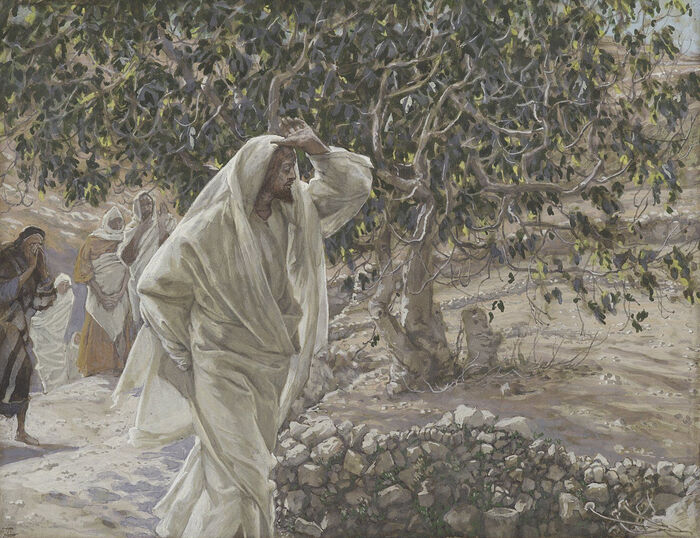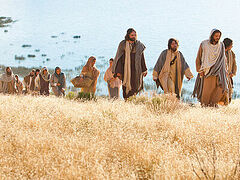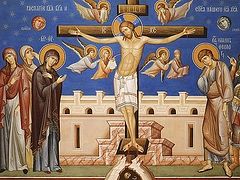 The cursing of the fig tree. Artist: James Tissot
The cursing of the fig tree. Artist: James Tissot
In the name of the Father and of the Son and of the Holy Spirit!
Dear brothers and sisters! The last week before Pascha is dedicated to the memory of the last days of the earthly life of the Savior, His sufferings, death, and burial, and is called Holy and Great Week. “We call this week great,” says St. John Chrysostom, “not because its days are longer or there are more of them, but because our Lord has performed great and ineffable benefactions throughout this week. In this week, the long battle is over, death is destroyed, the curse is destroyed, the power of the devil is destroyed, his instruments are plundered, God is reconciled with man, and Heaven becomes accessible to him; men are united with the angels… the barrier is removed, and the God of peace reconciles the Heavenly and the earthly.”
Additionally, every day of Holy Week has been since ancient times dedicated by the Church to special commemorations. Contemplating the humiliation and glory of the Son of God in the Old Testament prefigurations, on Holy Monday, the Church commemorates the chaste Joseph. “Joseph,” the Synaxarion says, “is an image of Christ, because Christ becomes an object of envy for His fellow Jews, is sold by a disciple for thirty pieces of silver, is confined in the dark and gloomy pit of the tomb, and having risen from it by His own power, reigns over Egypt, that is, is victorious over all sin, ruling over all the world; in His love for mankind, He redeems us by the gift of mystical grain and feeds us with Heavenly bread—His life-giving flesh.”
Contemplating the innocent sufferings of Jesus Christ in the types of the Old Testament, the holy Church calls to mind the Gospel narrative about the barren fig tree, which withered up at the word of the Lord. When Christ the Savior and His Disciples were returning from Bethany to Jerusalem, He grew hungry. Seeing the fig tree, the Lord went up to it, and finding nothing but leaves, He said: Let no fruit grow on thee henceforward for ever. And presently the fig tree withered away (Mt. 21:19).
Behold, brothers and sisters, such is the power of the Divine word! Throughout His earthly ministry, the Savior only taught, forgave, healed, and resurrected, and now, at the end of His ministry, He utters a curse. But why and for what purpose does the Lord subject a soulless creation, which is unable to feel either punishment or mercy, to such a fate? The Lord couldn’t have cursed the fig tree just because He felt hungry and found no fruit on it. We know from the Gospel that before His public ministry, the Lord Jesus Christ spent forty days and nights in fasting and prayer, and despite hunger, He indignantly rejected the tempter’s suggestion to turn stones into bread.
The fig tree was cursed by the Lord, brothers and sisters, not in revenge for its barrenness, but to show the lofty goal, the mission of the Son of God—the salvation of mankind. It was one of those symbolic actions by which the Savior sometimes, instead of words, expressed the lofty truths of His teaching. The cursing of the fig tree shows us that just as there is a time for mercy and patience, so there is a time for judgment and punishment.
St. John Chrysostom says that, “since the Lord has always been beneficent and punished no one, He had to give them proof of His justice and vengeance, that the Disciples and Jews might know that though He could wither up His crucifiers, like the fig tree, He voluntarily surrenders Himself to crucifixion; that He didn’t want to show this upon men, but furnished the proof of His justice upon the tree.”
This fig tree was an image of the Jewish people, and its cursing is an image of the rejection of the Jews. It had leaves and looked as if there were fruit on it (and the Jewish people observed outward religiosity, adhering to rituals and traditions), but there was no fruit on the fig tree, and there was no fruit of faith and religiosity in the Jewish people; and both were rejected by God. Depicting the fate of the Jewish people by the cursing of the fig tree, the Lord wanted to show His future judgment of unrepentant sinners by a momentous action to bring us to reason. Every soul that doesn’t bring forth spiritual fruit is likened to the withered fig tree, for whoever has no good deeds sanctified by faith and prayer won’t be protected from condemnation by external manifestations, for it’s not enough for salvation just to be baptized and called a Christian, but we have to be a Christian in deeds, in our lives.
St. John the Baptist called to repent and bring forth therefore fruits meet for repentance (Mt. 3:8). The Lord will ask us for fruits of repentance at the Dread Judgment. What are these fruits? They are works of mercy and compassion, works of Christian love, namely: to visit the sick and imprisoned, to feed the hungry and give drink to the thirsty, to clothe the naked, to give shelter to the stranger, to guide a man on the path of truth and salvation, to have peace between us, and to humbly and patiently bear our cross in life.
In addition to the story about the barren fig tree, the holy Church also edifies us in the Matins Gospel with the parable of the wicked vinedressers, spoken by the Savior this day. In this parable, which depicts in the most direct way, the Jews who used to beat the prophets, and who crucified the Son of God with His coming to earth, one can’t help but see the terrible censure for Christians who violate the commandments of God and thereby continue to crucify the Savior Himself with their sins.
In the Gospel reading at Liturgy, the holy Church reminds us of the fate of the Jewish people and of the end of the world, as all this was predicted by Jesus Christ. With the image of great calamities and the end of the age, the faithful are called to prayer and spiritual vigilance, to also be ready to meet the coming Christ with a pure soul; they’re called to generosity and patience and are comforted by the Savior’s promise of the spreading of the Gospel throughout the world, and that disasters will be stopped for the sake of the elect.
Dear brothers and sisters! So that we not become like the barren fig tree and not put our lives in eternal danger, so we might be delivered from eternal sufferings and might be justified at the righteous Judgment of God, we must adorn our lives with good deeds. Be faithful children of the holy Orthodox Church, keep holy its covenants and statutes, always go to the church of the Lord and there educate your soul for eternal life, fervently pray to the Lord, constantly read the word of God and incarnate it in your life, condemn no one, pray for one another, patiently bear one another’s infirmities, forgive one another, and the God of peace, our Lord Jesus Christ Who suffered for us will ever be with us, and at His second and glorious coming, He won’t abandon us, but will account us worthy of His invitation: Come, ye blessed of My Father, inherit the Kingdom prepared for you from the foundation of the world (Mt. 25:34).




